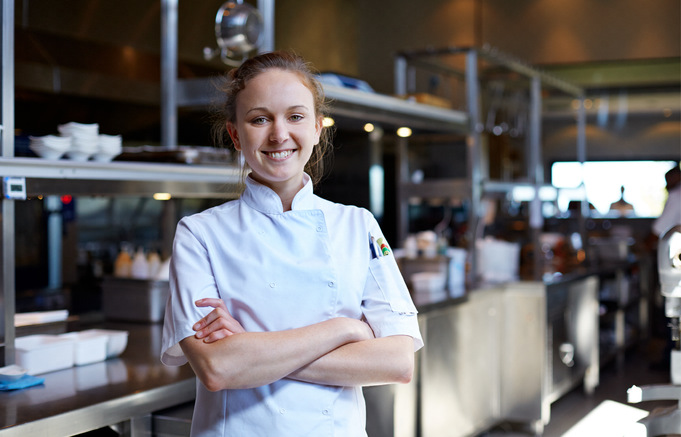The executive chef career path: is it right for me?



If you have a passion for culinary arts, have you considered a career as an executive chef? An executive chef is the highest-ranking chef in a professional kitchen, responsible for all culinary operations and every dish that leaves the kitchen. In this role, you can express your creativity, lead culinary teams, formulate menus, and be at the forefront of delivering memorable dining experiences.
Studying at a culinary school like École Ducasse is the ideal launch pad for a successful career as an executive chef. With its renowned culinary programs, state-of-the-art facilities, and industry connections, culinary students develop the skills, knowledge, and networks necessary to thrive.
Whether you're starting out or considering a career change, becoming an executive chef offers exhilarating and rewarding career paths where you can make an indelible mark on the culinary world. In this guide, you'll discover everything you need to know about how to become an executive chef.
What is an executive chef?
An executive chef is a top-level culinary professional who oversees all areas of a kitchen's operations. With an in-depth knowledge of the science of cooking, they can work in a range of kitchens, from fine dining establishments to resorts, hotels, cruise ships, and catering companies.
Some executive chefs oversee multiple kitchens or culinary operations for large-scale establishments with multiple dining outlets. Executive chefs are responsible for kitchen management, food preparation, recipe development, quality control, and leading a team of cooks and chefs.
Executive chef vs. head chef
Executive chef vs head chef – what's the difference? Executive chef and head chef are terms commonly used to refer to the top professional in a kitchen. Both roles involve overseeing kitchen operations. The preferred title usually comes down to the individual establishment's preferences or organizational structure.
What are the benefits of being an executive chef?

Klaus Vedfelt/ Royalty-free via getty images
Being an executive chef provides a platform for creative expression where you can showcase your culinary expertise and create innovative and unique dishes that delight diners. Executive chefs enjoy leadership positions and competitive salaries where they can guide and inspire a team of talented individuals and pass on their knowledge and experience.
The role also offers great opportunities for professional growth and advancement within the culinary industry and enables executive chefs to leave a lasting culinary legacy on the gastronomic landscape.
Culinary schools and degree programs
Culinary schools and degree programs provide aspiring chefs with the skills and knowledge to become successful executive chefs. Culinary schools like École Ducasse offer world-renowned culinary programs that combine classroom teaching, practical experience, and industry exposure that prepares students for culinary leadership roles. A culinary arts degree provides students with comprehensive training across various culinary disciplines and ensures they have the necessary confidence and expertise to pursue executive chef positions and excel in a competitive industry.
Which degree is best for an executive chef?
To become an executive chef, you'll need a culinary arts degree and industry experience as a line cook or sous chef. While working up to more senior roles, you must stay updated on industry trends, hone your leadership skills, and cultivate a diverse skill set.
Apprenticeships and on-the-job training
Apprenticeships allow you to develop under the guidance of experienced professionals. This hands-on learning offers practical knowledge and experience in a real-world kitchen environment, as you acquire essential skills in food preparation, cooking techniques, and kitchen operations. On-the-job training also complements your formal education by helping you develop a deep understanding of the dynamics and management of a kitchen while refining your skills.
Skills, qualities, and techniques
To become an executive chef, you'll need an excellent combination of culinary skills, personal qualities, and techniques.
- Culinary excellence: You need advanced culinary skills and techniques, including mastery of cooking methods, an understanding of flavor profiles, and the ability to create innovative and attractive dishes.
- Leadership abilities: You must develop strong leadership skills to guide and inspire your kitchen teams. You'll also require effective communication, delegation, and motivational skills to create a productive and harmonious work environment.
- Time management: Excelling in a fast-paced professional kitchen requires exceptional time management skills and the ability to efficiently organize tasks, prioritize responsibilities and meet deadlines without compromising quality.
- Adaptability: The culinary industry is dynamic and constantly changing. Flexibility is key to handling unexpected challenges, adjusting to new trends, and consistently maintaining high standards in demanding circumstances.
- Creativity and innovation: Executive chefs must have creative flair to develop distinctive menus and incorporate innovative techniques and ingredients.
- Business acumen: Executive chefs need a solid understanding of budgeting, inventory management, and cost control. They must be able to analyze profitability and make informed decisions to achieve financial objectives.
- Communication skills: Effective communication is essential for executive chefs, especially when collaborating with kitchen staff and suppliers.
- Continuous learning: Successful executive chefs stay updated on culinary trends, attend workshops, and seek opportunities to expand their knowledge and skills.
- Food safety and sanitation: Executive chefs must be knowledgeable about food handling, storage, and hygiene to ensure the safety of staff and customers.
Launch a successful culinary arts career at the world's leading culinary school.
Combining essential skills and techniques with priceless real-world experience, our degree is the start of your career as a leading executive chef.
Management and leadership skills
Strong management and leadership skills are crucial so executive chefs can run a kitchen and lead teams effectively. These skills include communication, delegation, and conflict resolution to create a productive work environment. Strategic planning, budget, and inventory management skills ensure efficiency. Motivating culinary staff, providing guidance and feedback, and promoting professional development, are also key to building a high-performing team.
Creativity and innovation

Creativity and innovation are important qualities for executive chefs to distinguish themselves in the culinary industry. Leading executive chefs continuously push the boundaries of culinary artistry, developing exciting flavor combinations, exquisite presentation, and dining experiences. They embrace innovative cooking techniques, experiment with new ingredients, and stay ahead of emerging food and dining trends.
Time management and multi-tasking abilities
Successful executive chefs need excellent time management and multi-tasking abilities to navigate the demanding and fast-paced kitchen environment. Effective time management skills enable executive chefs to meet deadlines, ensure smooth operations, and deliver high-quality food on schedule. They can prioritize tasks, delegate efficiently and create well-structured workflows to optimize productivity.
How do I advance in my career as a chef?
Advancing your career as a chef takes dedication, continuous learning, and strategic planning. A great starting point is studying at a culinary school like École Ducasse, where you'll receive a comprehensive culinary education, industry-recognized credentials, networking opportunities, training, and internships. It will equip you with a strong foundation, expand your skills and provide valuable industry connections for the future. Here are some other key steps to help you advance in your culinary career.
- Gain hands-on experience: Look for opportunities to work in different kitchen environments, including restaurants and culinary establishments where you can master different cuisines.
- Specialize and diversify: Consider which areas of culinary specialization interest you, such as seafood, desserts, regional cuisines, or molecular gastronomy, and develop your expertise in those areas.
- Networking: Build a strong culinary network by attending events, joining industry associations, and participating in competitions that enable you to connect with industry leaders, peers, and potential employers.
- Leadership and management skills: Hone your leadership and management skills by seeking opportunities to lead kitchen teams and manage operations where you can demonstrate your ability to handle a range of responsibilities.
Entry-level positions
Entry-level positions in the culinary industry provide a solid foundation for chefs to gain experience working in a professional kitchen. Here are some common entry-level positions.
- Kitchen prep cook: Assist in food preparation, such as measuring ingredients, chopping vegetables, and basic cooking tasks.
- Line cook: Work on specific stations within a kitchen, such as sauté or grill, and prepare and cook dishes according to established recipes.
- Pastry assistant: Support pastry chefs with pastry preparation and baking and assist with measuring ingredients, assembling desserts, and maintaining the hygiene and cleanliness of the pastry section.
- Kitchen steward/dishwasher: They are essential for cleaning dishes, utensils, and kitchen equipment. They may also help with general kitchen duties.
- Catering assistant: Assist with the setup, serving, and cleaning up at catering events.
- Sous chef apprentice: Working closely with the sous chef, you'll learn various aspects of kitchen management and culinary techniques.
Mid-level positions
Mid-level positions enable you to develop skills, take on more responsibilities, and advance your career. Some common mid-level positions include the following.
- Chef de partie: They oversee preparation, cooking, food plating and ensure the quality and consistency of the food.
- Pastry chef: Pastry chefs create pastries, desserts, and baked goods, and are responsible for developing and delivering pastry menus, overseeing production, and managing a pastry team.
- Sous chef: Sous chefs are typically second in command within a professional kitchen environment and work directly under the executive chef.
- Banquet chef: This role oversees culinary operations for large-scale banquets and events.
- Restaurant chef: Restaurant chefs manage kitchen operations in a restaurant, oversee menu development and collaborate with the front-of-house team to deliver an exceptional dining experience.
- Culinary instructor: Some experienced chefs move into teaching, imparting their knowledge and skills to aspiring chefs and culinary professionals.
Executive Chef positions
Executive chef positions are top-level roles within the culinary industry. Here are some common roles and potential earning capacities:
Executive chef: $106,680
Chef de cuisine: $85,134
Corporate executive chef: $135,832
Research and development chef: $102,821
Consulting chef: $94,062
Culinary director: $69,847.
As the culinary industry continues to grow and evolve, the demand for talented executive chefs is also expected to grow. The US Department of Labor predicts demand for chefs over the next 10 years will increase by 23,600, representing 15% growth.
How much does an executive chef make per year?
 Hispanolistic/E+ via getty images
Hispanolistic/E+ via getty images
You can earn up to $106,680 per year as an executive chef. However, this will depend on your experience, location, and the type and size of the establishment where you're employed.
What are executive chef career paths?
Executive chef career paths offer various avenues for specialization and advancement within the industry. Some common career paths for executive chefs include the following.
- Culinary operations management: Executive chefs can progress to senior management roles such as food and beverage directors.
- Restaurant ownership or entrepreneurship: Some executive chefs open their own restaurants or culinary businesses.
- Consulting and culinary training: Experienced executive chefs can take up consulting roles where they provide culinary expertise or become culinary trainers and educators.
- Food and beverage management: Executive chefs can choose to take up opportunities in food and beverage management.
- Culinary media and publishing: Some executive chefs decide to become culinary media personalities, publishing cookbooks, hosting cooking shows, or contributing to culinary publications.
- Specialized cuisine or concept development: Executive chefs may specialize in specific cuisines or focus on developing and promoting a particular culinary concept.
- International opportunities: Some executive chefs can work abroad and explore cuisines from different parts of the world to expand their repertoire.
Begin the rewarding journey to success as an executive chef with this world-class diploma in culinary arts.
With expert tuition from industry leaders and hands-on experience in an inspiring setting, you'll have the vital skills for an exhilarating culinary career.
Conclusion
Executive chef career paths offer exciting and rewarding opportunities for talented professionals to expand their horizons, elevate their skills and make a lasting impact in the culinary world. With expert guidance and education at a renowned culinary institution like École Ducasse, you'll gain the knowledge, techniques, and industry connections to thrive as an executive chef.
Photo credits
Main image: John Rensten/ The Image Bank via getty images


